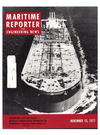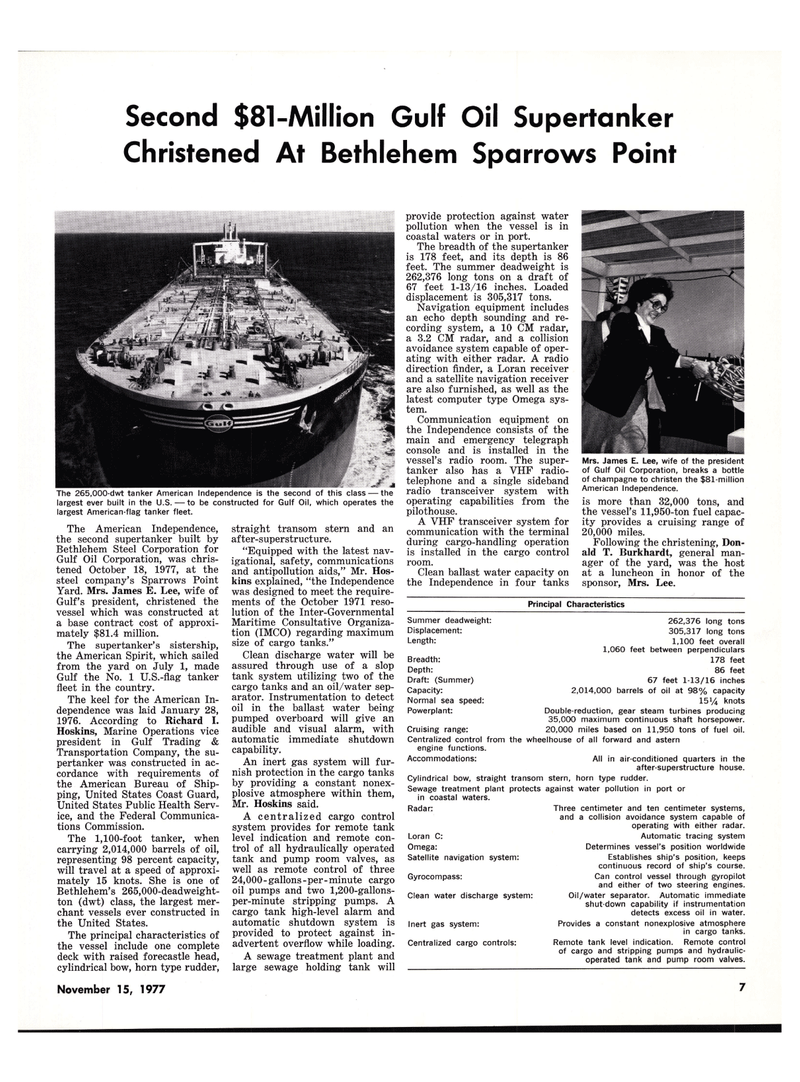
Page 5: of Maritime Reporter Magazine (November 15, 1977)
Read this page in Pdf, Flash or Html5 edition of November 15, 1977 Maritime Reporter Magazine
Second $81-Million Gulf Oil Supertanker
Christened At Bethlehem Sparrows Point w
B *
The 265,000-dwt tanker American Independence is the second of this class — the largest ever built in the U.S. — to be constructed for Gulf Oil, which operates the largest American-flag tanker fleet.
The American Independence, the second supertanker built by-
Bethlehem Steel Corporation for
Gulf Oil Corporation, was chris- tened October 18, 1977, at the steel company's Sparrows Point
Yard. Mrs. James E. Lee, wife of
Gulf's president, christened the vessel which was constructed at a base contract cost of approxi- mately $81.4 million.
The supertanker's sister ship, the American Spirit, which sailed from the yard on July 1, made
Gulf the No. 1 U.S.-flag tanker fleet in the country.
The keel for the American In- dependence was laid January 28, 1976. According to Richard I.
Hoskins, Marine Operations vice president in Gulf Trading &
Transportation Company, the su- pertanker was constructed in ac- cordance with requirements of the American Bureau of Ship- ping, United States Coast Guard,
United States Public Health Serv- ice, and the Federal Communica- tions Commission.
The 1,100-foot tanker, when carrying 2,014,000 barrels of oil, representing 98 percent capacity, will travel at a speed of approxi- mately 15 knots. She is one of
Bethlehem's 265,000-deadweight- ton (dwt) class, the largest mer- chant vessels ever constructed in the United States.
The principal characteristics of the vessel include one complete deck with raised forecastle head, cylindrical bow, horn type rudder, straight transom stern and an after-superstructure. "Equipped with the latest nav- igational, safety, communications and antipollution aids," Mr. Hos- kins explained, "the Independence was designed to meet the require- ments of the October 1971 reso- lution of the Inter-Governmental
Maritime Consultative Organiza- tion (IMCO) regarding maximum size of cargo tanks."
Clean discharge water will be assured through use of a slop tank system utilizing two of the cargo tanks and an oil/water sep- arator. Instrumentation to detect oil in the ballast water being pumped overboard will give an audible and visual alarm, with automatic immediate shutdown capability.
An inert gas system will fur- nish protection in the cargo tanks by providing a constant nonex- plosive atmosphere within them,
Mr. Hoskins said.
A centralized cargo control system provides for remote tank level indication and remote con- trol of all hydraulically operated tank and pump room valves, as well as remote control of three 24,000-gallons-per-minute cargo oil pumps and two 1,200-gallons- per-minute stripping pumps. A cargo tank high-level alarm and automatic shutdown system is provided to protect against in- advertent overflow while loading.
A sewage treatment plant and large sewage holding tank will provide protection against water pollution when the vessel is in coastal waters or in port.
The breadth of the supertanker is 178 feet, and its depth is 86 feet. The summer deadweight is 262,376 long tons on a draft of 67 feet 1-13/16 inches. Loaded displacement is 305,317 tons.
Navigation equipment includes an echo depth sounding and re- cording system, a 10 CM radar, a 3.2 CM radar, and a collision avoidance system capable of oper- ating with either radar. A radio direction finder, a Loran receiver and a satellite navigation receiver are also furnished, as well as the latest computer type Omega sys- tem.
Communication equipment on the Independence consists of the main and emergency telegraph console and is installed in the vessel's radio room. The super- tanker also has a YHF radio- telephone and a single sideband radio transceiver system with operating capabilities from the pilothouse.
A VHF transceiver system for communication with the terminal during cargo-handling operation is installed in the cargo control room.
Clean ballast water capacity on the Independence in four tanks
Mrs. James E. Lee, wife of the president of Gulf Oil Corporation, breaks a bottle of champagne to christen the $81-million
American Independence. is more than 32,000 tons, and the vessel's 11,950-ton fuel capac- ity provides a cruising range of 20,000 miles.
Following the christening, Don- ald T. Burkhardt, general man- ager of the yard, was the host at a luncheon in honor of the sponsor, Mrs. Lee.
Principal Characteristics
Summer deadweight:
Displacement:
Length:
Breadth:
Depth:
Draft: (Summer)
Capacity:
Normal sea speed:
Powerplant:
Cruising range: 262,376 long tons 305,317 long tons 1,100 feet overall 1,060 feet between perpendiculars 178 feet 86 feet 67 feet 1-13/16 inches 2,014,000 barrels of oil at 98% capacity 15% knots
Double-reduction, gear steam turbines producing 35,000 maximum continuous shaft horsepower. 20,000 miles based on 11,950 tons of fuel oil.
Centralized control from the wheelhouse of all forward and astern engine functions.
Accommodations: All in air-conditioned quarters in the after-superstructure house.
Cylindrical bow, straight transom stern, horn type rudder.
Sewage treatment plant protects against water pollution in port or in coastal waters.
Three centimeter and ten centimeter systems, and a collision avoidance system capable of operating with either radar.
Automatic tracing system
Determines vessel's position worldwide
Establishes ship's position, keeps continuous record of ship's course.
Can control vessel through gyropilot and either of two steering engines.
Oil/water separator. Automatic immediate shut-down capability if instrumentation detects excess oil in water.
Provides a constant nonexplosive atmosphere in cargo tanks.
Remote tank level indication. Remote control of cargo and stripping pumps and hydraulic- operated tank and pump room valves.
Radar:
Loran C:
Omega:
Satellite navigation system:
Gyrocompass:
Clean water discharge system:
Inert gas system:
Centralized cargo controls:
November 15, 1977 7

 4
4

 6
6
